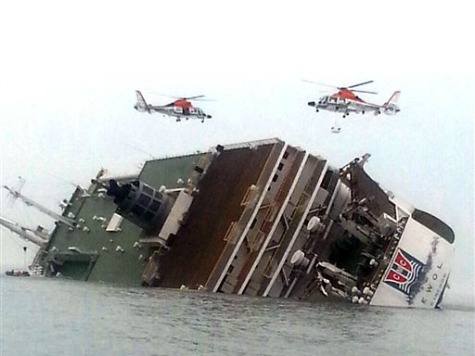The Chinese government has begun to remark on South Korea’s rescue operations following the capsizing of a ferry that possibly killed hundreds. Chinese news outlet Xinhua reports the government is urging South Korea to “make all-out search and rescue efforts,” language echoing statements to Malaysia regarding missing flight MH370.
“Chinese diplomats have urged the Republic of Korea (ROK) to check the passenger list of its sunken ferry and make all-out search and rescue efforts,” Xinhua cites a Chinese Foreign Ministry spokeswoman as saying. The Chinese argue they have a national interest in investing themselves in the search for the missing after the ferry capsized near the town of Ansan, as four of the missing passengers have been confirmed to have Chinese citizenship. To confirm whether more Chinese citizens were on board, the government is pushing South Korea to reveal the full list of passengers.
While there is nothing atypical about a nation wanting to know whether they have citizens to protect in the event of a disaster, the language of Xinhua’s report echoes all-too-recent tensions with another neighboring power: Malaysia, against whom the Chinese government used much harsher language to condemn their efforts in finding missing Malaysia Airlines Flight 370. While the language towards South Korea, with whom the Chinese government have long had territorial disputes, particularly in shared seas, can be best described as urgent nudging, China’s government spokespeople were outright hostile towards the Malaysian government.
China lost more than one hundred citizens on MH370–a valid reason for concern–but the combined territorial tensions with China’s bravado when faced with such disasters seem to belie an urgency to present itself as Asia’s regional, undisputed superpower: the world police of the Eastern Hemisphere.
The exasperated language in Xinhua towards Malaysia began with statements from spokesman Qin Gang, who called Malaysia’s operation “pretty chaotic” and emphasized that China “repeatedly and unceasingly requested and urged the Malaysian side to do their utmost.” Reports in Xinhua and the South China Morning Post, among others, mocked the Malaysian efforts by tying the government to local shaman who had independently arrived at Kuala Lumpur Airport to pray for the safety of those on board the plane. One report in the Post, titled “Video: Chinese ridicule Malaysia’s recruitment of ‘witch doctor’ to track missing plane,” compiled critical Weibo comments and alleged this to be the national sentiment of China towards the nation of Malaysia.
Such an attitude has led to Chinese travel agencies boycotting Malaysia Airlines, relatives of those missing protesting against the Malaysian embassy in Beijing, and a backlash against the Chinese government in Malaysian media, which began to see their nation “under siege” during a time of tragedy and mourning.
While four Chinese citizens are missing in the South Korean ferry tragedy, the beginnings of a similar campaign against South Korea are apparently germinating. The ferry capsized with 475 people aboard, 325 of those believed to be Korean high school students. Some were rescued, but more than 200 remain missing, and survivors allege that the rescue efforts were improperly conducted. More than 48 hours since the ship collapsed, many on board are presumed dead. On Friday, the vice principal of the high school whose students were on board was found dead of an apparent suicide in response to the loss of so many young students.
The Chinese government has not, as it has done in the Malaysian disaster, intervened in search and rescue operations. But if the search continues and the government continues to feed tense statements to Xinhua urging the South Korean government to do more, the possibility exists that they might intervene.
If the search for Malaysia Airlines Flight 370 is any indication, an intervention by the Chinese into the Korean rescue operation would be little help. The New York Times reported this week that the Chinese had frustrated international search crews, particularly those from the United States and Australia, by diverting search operations towards false leads and boasting of new developments in their search efforts that misled investigators. One such claim of finding debris, which turned out to be fishing equipment unrelated to Flight 370, could have cost search teams the time necessary to find the plane’s black box. The box’s battery had a life-expectancy of only 30 days and has stopped sending out radio signals this week, it appears.
With every such disaster in the region, China appears increasingly willing to intervene, resorting first to prodding and, in the case of Malaysia, media bullying to appear in charge of the region. What this boasting means for the West remains to be seen, and opportunities for such displays are assuredly rare. But in a region increasingly destabilized by rogue nations like North Korea, such tensions could easily explode into something bigger and merit a close eye.

COMMENTS
Please let us know if you're having issues with commenting.